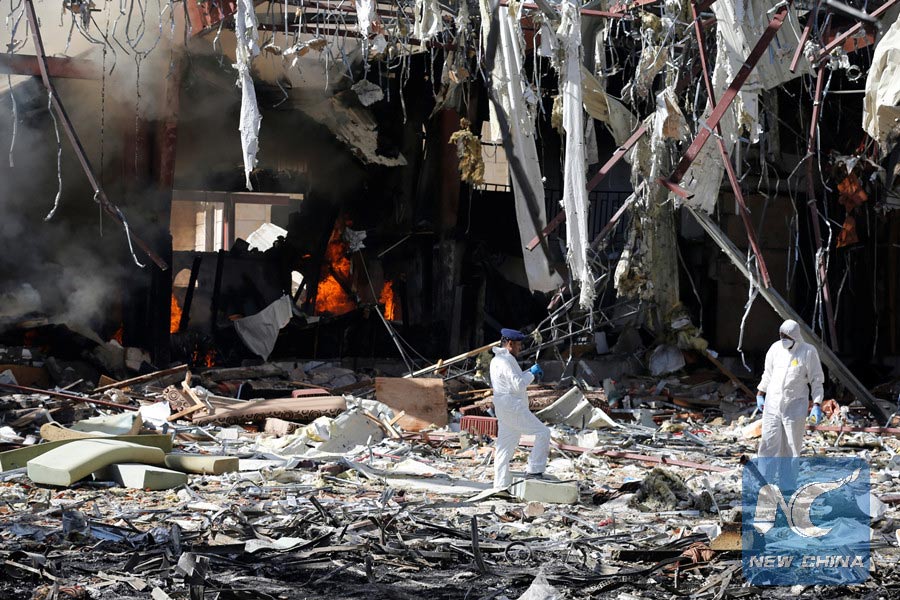


Forensic experts investigate the scene at the community hall where Saudi-led warplanes struck a funeral in Sanaa, the capital ofYemen, October 9, 2016. (Reuters photo)
TEHRAN, Oct. 9 -- The alleged deadly attack by Saudi-led coalition on a mourning ceremony in Yemen's capital Sanaa on Saturday drew strong criticism from the Islamic republic officials.
Iran's Defense Minister Hossein Dehqan said Sunday that the Saudi Arabia rulers are "war criminals and should be put on trial" over its strike on Yemen's capital Sanaa, Tehran Times daily reported.
"They have committed an unpardonable crime which should not go unnoticed by the world," Dehqan said, adding that "Whoever keeps silence vis-a-vis this barbarity will have assisted the Al-Saud (Saudi kingdom) with the crime."
On Saturday, reports said that Saudi-led airstrikes targeted Qaah al-Kubra, one of Sanaa's biggest event halls, as it was hosting a funeral ceremony.
According to medical sources, the attack left more than 160 people killed, including military leaders and government officials allied with Iran-backed Shiite Houthis and their ally Yemen's former President Ali Abdullah Saleh.
Hundreds of others, mostly civilians, were injured and many bodies were completely burned and turned into ashes, witnesses near the scene said.
Also, the secretary of Iran's Supreme National Security Council, Ali Shamkhani, said Sunday that the Saudi coalition has used the U.S. in the attack on Sanaa.
The Yemeni people at the funeral ceremony were bombed by American weapons delivered to the "aggressive Saudi army," Shamkhani said in a statement, stressing that the U.S. is an "accomplice" in the crime and should be held accountable for it.
"Sales of arms to Saudi Arabia and the (United Arab) Emirates play a key factor in the military aggression against Yemen and the killing of innocent Yemenis, and the West should stop it," the top security official was quoted as saying.
Shamkhani said that western public opinion should realize what role their governments are playing in the continuation of the war on Yemen.
On Saturday, Iranian Foreign Ministry condemned the alleged air strikes of the coalition on mourners in Sanaa.
The Foreign Ministry spokesman Bahram Qasemi expressed regret that the international community was silent over the military aggression of the coalition and the killing of the innocents.
In order to put an end to the fabricated crisis in Yemen, there was no way but to stop the belligerent aggressors and begin serious dialogue with the participation of all Yemeni sides, Qasemi said.
He expressed Iran's strong disapproval over such an "inhumane and heinous crime" and sympathized with the families of the victims.
The Saudi-led Arab coalition has denied any role in the attack in Sanaa banquet hall, inviting to explore other possible reasons by launching an immediate investigation.
The Houthis, allied with Ali Abdullah Saleh's loyal forces, stormed Sanaa in September 2014, fighting against what they said "Hadi's government corruption."
They seized Sanaa and much parts of the country's north, forcing President Mansour Hadi and his government to flee into exile.
The Saudi-led coalition launched a military air campaign against Houthis and Saleh's forces on March 26, 2015 to restore Hadi to power and recapture the capital.
The coalition's airstrikes and ground battles have since killed over 10,000 Yemenis, mostly children and women, injuring around 35,000 others and displacing three million others, according to UN reports.
Saudi Arabia and its Arab allies have accused Iran of arming the Houthis.
Last month, a letter by Saudi Arabia to the UN Security Council also alleged that Iran was transferring weapons to the Houthi fighters in violation of UN Resolution 2216.
Iran denied Saudi claims, saying that allegations about transporting arms into Yemen were "unfounded and undocumented."